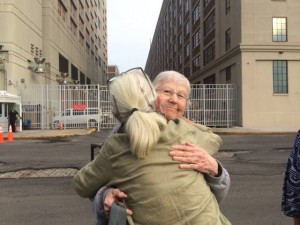 The Catholic nun and two military veterans & Catholic Workers spent 2 years in prison for their 2012 Transform Now Plowshares direct disarmament action at the Y-12 nuclear weapons complex in Tennessee. Sr. Megan Rice was due out in November, 2015; Greg Boertje-Obed and Michael Walli were due out in fall, 2017. But their lawyers appealed their sabotage conviction… and it was overturned! Today (May 16) all three were released from prison!!! Their message – and the work – continues: DISARM NUCLEAR WEAPONS!
The Catholic nun and two military veterans & Catholic Workers spent 2 years in prison for their 2012 Transform Now Plowshares direct disarmament action at the Y-12 nuclear weapons complex in Tennessee. Sr. Megan Rice was due out in November, 2015; Greg Boertje-Obed and Michael Walli were due out in fall, 2017. But their lawyers appealed their sabotage conviction… and it was overturned! Today (May 16) all three were released from prison!!! Their message – and the work – continues: DISARM NUCLEAR WEAPONS!
More information on their action, trial and sentencing.
Huffington Post interview here.
Protester has no regrets about Y-12 break-in
from the Knoxville News Sentinel
by Frank Munger
May 17, 2015
Greg Boertje-Obed turns 60 years old Monday, and the best birthday gift he got was his freedom.
Looking thin and a bit tired and sporting a new pair of jeans courtesy of the federal prison system, Boertje-Obed arrived in Knoxville shortly before 7 p.m. Sunday following a 20-hour bus ride from Kansas — where the spent the last 14 months serving time in Leavenworth Federal Penitentiary.
He was greeted at the Greyhound Bus Station by friends and well-wishing peace activists.
Boertje-Obed and the other two Plowshares protesters who broke into the Y-12 nuclear weapons plant on July 28, 2012 — Sister Megan Rice, 85, and Michael Walli, 67 — were released from federal prison over the weekend.
Their release followed a ruling by the 6th U.S. Circuit Court of Appeals that reversed their conviction on sabotage charges. Because they likely have already served more time than required for their other conviction on a felony count of damaging government property, the court approved an “emergency motion” for their release pending a decision by the U.S. government on whether to appeal the sabotage reversal.
Boertje-Obed said he was very happy and thankful to the attorneys “who demonstrated a great genius” in convincing two of the three appeals court judges to overturn the conviction on sabotage — the most serious of the charges that equated the anti-nuclear activists with terrorists.
Was the break-in at Y-12, where the protesters spray-painted messages on the storehouse for bomb-grade uranium and splashed the facility with human blood, worth being incarcerated for two years?
“Oh, definitely,” he said. “I believe a lot of good came from this action and from our being in jail also.”
Boertje-Obed is a bit puzzled as to why he ended up in Knoxville following his release from Leavenworth. When prison officials talked to him about his court-ordered release, he told them he wanted to go to Duluth, Minn., where his wife, Michele Naar-Obed, lives. That seemed to be the plan, but he was later given a bus ticket to Knoxville — where he and the others were tried in U.S. District Court in 2013.
He said the plan is for him to meet with a probation officer on Monday and hopefully make arrangements to get to Duluth.
Rice, who served time at a federal prison in Brooklyn, N.Y., reportedly was spending time with family following her release, and Walli, who’s been incarcerated in Pennsylvania, is now with friends in Washington, D.C.
Boertje-Obed said the three protesters were not allowed to communicate with each other over the past 14 months, despite repeated efforts.
The military veteran said he has lost count of how much time he has spent behind bars for his protests against nuclear weapons, but he said the Y-12 break-in was his sixth Plowshares action. He said he wasn’t sure if there would be a seventh.
When people ask if he’s willing to risk increasingly long jail terms for his actions, he said he points to Rice as an example.
“She was 82 when she did that (Y-12) action,” he said. “I’m almost 60, so I have many years left.”
xxx
A Nun Walks Free: The Government’s Sabotage Case Dismissed
from The New Yorker
by Eric Schlosser
On May 16th, three Christian pacifists—Gregory Boertje-Obed, a sixty-year-old housepainter; Michael Walli, a Vietnam veteran in his early sixties; and Sister Megan Rice, an eighty-five-year-old nun who belongs to the Society of the Holy Child Jesus—were suddenly and unexpectedly released from federal prison. They are members of the Plowshares movement, which is devoted to abolishing nuclear weapons and seeking world peace. As I recounted in an article in the magazine, during the summer of 2012 they broke into the Y-12 National Security Complex, in Oak Ridge, Tennessee. Y-12 is a nuclear-weapons plant, often referred to as the Fort Knox of Uranium. After cutting through four fences with bolt cutters, evading sophisticated intruder alarms, and eluding armed guards authorized to use lethal force, the three activists reached the Highly Enriched Uranium Materials Facility—a fortified building that contains about nine hundred thousand pounds of weapons-grade uranium. Instead of trying to steal some of the uranium to make a bomb, as terrorists might, they threw blood on the building and spray-painted antiwar slogans on its walls. For this nonviolent act of civil disobedience, they were sent to prison for destroying government property and committing sabotage. The legal decisions that freed them last week were as unprecedented and surprising as the break-in that put them behind bars.
The fact that three people without commando training—let alone a nun, in her eighties, with a minor heart ailment—could get so close to the nation’s largest stockpile of weapons-grade uranium caused the Department of Energy a great deal of embarrassment. Although members of Congress thanked Sister Megan for helping to expose major security problems at Y-12, the Justice Department charged her, Walli, and Boertje-Obed with crimes that could bring prison sentences of as long as thirty-five years. After being found guilty by a jury, in May, 2013, Sister Megan was sentenced to three years in prison; Walli and Boertje-Obed to five. Their defense team decided not to appeal the convictions for destroying government property. The three not only admitted to cutting fences, spraying graffiti on the building, and throwing blood, they were proud of it. And they were willing to spend years in prison on behalf of their beliefs.
The sabotage charge, however, seemed unreasonable. Enacted during the First World War, the Sabotage Act ostensibly aims to prevent enemies of the United States from damaging factories, weapons, and equipment essential to the war effort. But the statute’s definition of sabotage is so broad—the “intent to injure, interfere with, or obstruct the national defense of the United States”—that for almost a century the law has been used mainly to incarcerate people who use civil disobedience to protest against the nation’s defense policies. During the nineteen-eighties, one anti-nuclear activist was convicted of sabotage after breaking into a Minuteman missile site, and given a prison sentence of eighteen years. Walli, Boertje-Obed, and Sister Megan believed that nuclear weapons, not the protest against them, posed the real threat to America’s national security.
William P. Quigley, a professor of law at Loyola Marymount University, in New Orleans, worked closely with two young attorneys, Judy Kwan and Marc R. Shapiro, to appeal the sabotage convictions. Quigley had been defending peace activists since the late nineteen-eighties, but Kwan and Shapiro were relative newcomers to the field. Employed by the law firm of Orrick, Herrington & Sutcliffe, they spent thousands of hours on the Y-12 case, pro bono, leaving behind the world of patent, copyright, and security law to immerse themselves in the minutiae of nuclear-weapon production, Catholic pacifism, and the legal theory behind the Sabotage Act.
Jeffrey E. Theodore, an assistant U.S. Attorney, had managed to persuade a jury in Knoxville, Tennessee, that the three Plowshares activists had meant to harm—and indeed, had harmed—the national defense. After the break-in, Y-12 had been shut down for two weeks, delaying a shipment of uranium. Fences there had to be repaired; the security had to be upgraded; guards were diverted from their usual tasks; and the whole thing had harmed the reputation of the United States.
In March, during arguments before a three-judge panel of the Sixth Circuit Court of Appeals, Theodore implied that seeking the abolition of nuclear weapons might even be a form of sabotage. “These are people who have a desire, intent, to disarm, and they are taking action in furtherance of that goal,” he said. Shapiro countered that the sabotage charges were an example of government overreach, and he cited another recent case in which a woman who attempted to poison her husband’s mistress was convicted, under an anti-terrorist statute, of using a chemical weapon.
On May 8th, the court of appeals panel issued a two-to-one decision in the Y-12 case. The judge who wrote the opinion was appointed to the court by President George W. Bush; the judge who concurred was appointed by Ronald Reagan. They threw out the sabotage convictions, and their view of the government’s arguments was scathing. “The defendants’ actions in this case had zero effect, at the time of their actions or anytime afterwards, on the nation’s ability to wage war or defend against attack,” Judge Raymond Kethledge wrote. He criticized the government’s “vague platitudes” and the notion that Y-12’s guards were in any way diverted from their usual jobs: “responding to intrusions is what guards do.” The court vacated the defendants’ prison sentences and sent the case back to the original trial judge for resentencing.
The ruling and its tone surprised Quigley. This was the first time in thirty years that the sabotage conviction of an anti-nuclear protester had been overturned. He thought the decision conveyed a radical message for the federal judiciary: “Peaceful protest isn’t sabotage.” And the appeals court noted that the defendants had already served more time in prison than warranted by their conviction for destroying government property. The defense team requested that all three be released while awaiting an appearance before the original trial judge. Assistant U.S. Attorney Theodore offered no objection—another surprise. And, in a highly unusual move, on a Friday evening the court of appeals ordered that three be freed immediately. Sister Megan left the Brooklyn Detention Center the next day. Walli walked out of a medium-security prison in Pennsylvania. And Boertje-Obed was led from his cell at Leavenworth Penitentiary, in Kansas, and put on a bus to meet with a probation officer in Tennessee.
The government has until May 22nd to challenge the appeals court decision. It can also seek a thirty-day extension of that deadline. The original trial judge has scheduled a resentencing hearing for mid-July. In the meantime, the peace activists, no longer convicted saboteurs, can enjoy freedom after two years behind bars. They are still obligated to pay the government a fine of $52,953 for the break-in at Y-12. But they took vows of poverty decades ago, don’t have bank accounts, and have neither the means nor the intention of paying it.
